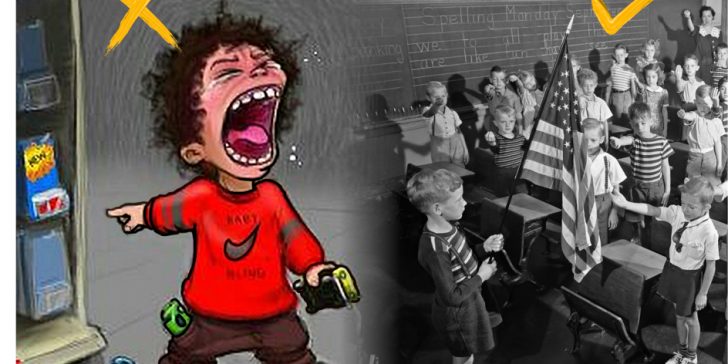
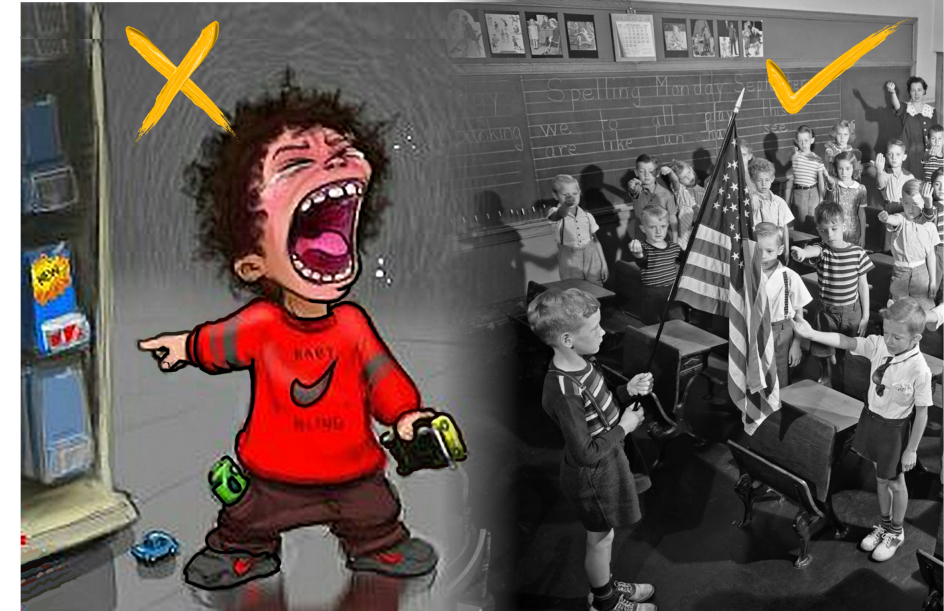
Child discipline is essential to the proper functioning of not only families but tribes, societies, and nations. Therefore, it is no surprise it was one of the Fifth Column targets mentioned in my April 14 piece. To eat away an enemy nation from within, destroying families and dissolving the moral fiber that makes children into responsible, hard-working adults, is high on the Left’s agenda.
When I mentioned the importance of child discipline in the past, trolls insisted it was child abuse, violence, bullying, assault, and so on. A favorite trick they utilize is to swap ‘smack, paddle, and discipline’ for ‘hit, belt, and abuse.’ They would say:
“There is no need to abuse children to get them to obey. Rather than hitting them, try using affection. Instead of belting them for making a mistake, cuddle them, and explain the problem. Being violent and assaulting children will only make them violent themselves. The golden lesson for raising children is love, love, and more love.”
There are nine lies woven into the mischievous sophistry above:
1) ‘There is no need to abuse…’ is a cock-and-bull phrase because proper child discipline is never abusive. The word ‘abuse’ (as a transitive verb) means ‘to use or treat so as to injure or damage.’ Disciplining children is designed to teach and fix, not injure or damage.
2) ‘…in order to get them to obey’ is a mistruth because ‘to obey’ is only part of the objective of discipline, which strives primarily to teach. Using love, respect, affection, and discipline, you can teach children to listen and learn. Obeying is a byproduct of that.
3) ‘Rather than hitting them’ is deception because ‘hitting’ is being used as an intransitive verb, ‘to strike a blow.’ ‘Strike’ means ‘to attempt to undermine or harm something as if by a blow,’ and discipline is not about undermining or harming. On the contrary, it is about coaching and learning.
4) ‘…try using affection’ is mischievous misdirection because it implies that affection is not used or is not an integral part of child discipline. Without deep and abiding love and affection, child discipline would fail and become something very different.
5 & 6) ‘Instead of belting them for making a mistake’ employs two lies. First, most child discipline involves a slap or spank to the back of the leg, not belting. Second, we do not use spanking when young children make mistakes, but rather when they intentionally misbehave.
7) ‘…cuddle them and explain the problem’ is a misdirection because it implies that disciplinarians do not cuddle or explain problems. It is a major part of discipline but must be timed carefully to avoid undoing the learned lesson. The child must learn the lesson before being rewarded.
8) ‘Being violent and assaulting children will only make them violent themselves’ is a phony mischaracterization, as already explained because violence and assault are not a part of child discipline.
9) ‘The golden lesson for raising children is love, love, and more love’ is wrong because they need more than love. It would be like saying that all you need to make a cake is yeast, yeast, and more yeast.
Child Discipline
*Caveat I
Rules and regulations about child discipline vary all around the world from country to country and state to state. I do not advocate breaking any laws. My views about disciplining children are for those places where such practices would be legal and accepted, as they were in most American states a few decades ago. If you live in an area where these techniques are not permitted, you should not use them. You might consider moving to a place where such methods are allowed, or you might try campaigning to change the laws, but please do not break such rules, especially under the misapprehension that I condone breaking the law because I do not.
Putting aside the constant ranting of the Left, who insist that any spanking is violence, let’s ignore them and get down to the nitty-gritty of how to discipline children.
It is vital that there are two parents and that the parents have traditional roles. The mother is a mother, not a pretend man, racing around working nine to five. She needs to be at home to look after her children. Also, both parents agree on the following methods. If one is applying discipline while the other undoes all this behind the first’s back, there will be significant problems. Both parents must work as a team to see this through for the best result.
Making World-Class Kids
Children are not born with a knowledge of right or wrong, so we must teach them. It is a huge task and not to be taken lightly. The Founding Fathers’ fathers would have agreed with William Ross Wallace when he wrote, “The Hand That Rocks the Cradle Is the Hand That Rules the World,” but when it comes to teaching children, there is an immediate problem. What if they ignore the lesson?
Parents today have no problem with that at all. They just let the children do whatever they like and make bleating noises from the side while the kids ignore them. That is a failure, not only for the parents but for the child.
Natural Selection metaphorically ‘solved the problem’ using pain. Animals that injured themselves without feeling pain would die after sustaining multiple injuries, while those that felt the pain would quickly learn to avoid damaging themselves.
In other words, when an animal bangs its head on a rock, it hurts, and the animal learns not to do it again. Children will knock their heads against a hard surface sooner or later, and nature will punish them when they do. They will cry, rub their head, and learn to be more careful.

Humans and other animals also use pain when teaching their young, though with less severity. They would not torture a child the way nature does, for fracturing a bone. Breaking a forearm by falling off a skateboard at eleven, a boy learns about real pain, and having experienced this, believe me, it cannot be confused with a clip across the ear.
Parents love their children and hate having to hurt them, so they use pain minimally to teach them lessons. Copying nature, they give their children the occasional slap on the back of the leg or butt, squeeze their ear lobe, or flick the very tip of their nose (a favorite in Korea). It stings a little and brings water to the child’s eyes, but it teaches them not to do whatever it was they did. The lesson may save their lives, so a small amount of pain is well worth it. Ask Mother Nature.
Basics
Many modern parents are oblivious to the basics of raising children, starting right from the get-go when they are babies. It irks me to see them doing everything wrong, so I will begin from the day the babe is a few weeks old, and here I must repeat a disclaimer found on my About page:
*Caveat II:
Information obtained from this website is not legal or medical advice, and it is not intended to be. You should consult an attorney or medical professional for personalized advice regarding your situation. You form no attorney-client relationship by viewing this website. I am not a doctor, specialist, medical practitioner, attorney, scientist, psychiatrist, accountant, economist, banker, or specialist of any kind, nor do I have any formal training in any of these or related areas. Since receiving a Diploma in Fine Art in 1977, my education is based on research, reading, libraries, books, essays, newspaper archives, documentaries, biographies, debates, etc. To avoid Marxist teachers like those I clashed with in university, and in a quest to find correct information, I avoid schools. Even so, my advice comes with no guarantees or promises of any kind. It may be correct or incorrect and may be right or not right for you. If you choose to follow my suggestions, you do so at your own risk. I shall not be held responsible for any problems, debts, difficulties, untoward events, accidents, or negative situations of any kind that may arise under any circumstances as a result of your following my advice. If you doubt this or do not understand this caveat, please do not follow my advice.
Foundations
Mothers should breastfeed babies if possible. That is nature’s way, and from what I can ascertain, except in rare cases, it is the best way. Some women are concerned about their nipples, wishing to keep them looking ‘perfect’ for their modeling or fashion careers. Others want to keep them ‘perfect’ for their boyfriends or husbands, who might not like the look of ‘chewed’ nipples.
Raising children requires adults. If you have the attitude described above, you are not an adult, in my opinion, but a child yourself, not qualified to raise children. Go, and return when you understand that your baby’s well-being is far more important than your career or your husband’s nipple fetish. Your priority is to ensure your infant has the best care and nutrition. Breast milk from a healthy mom is better for a tot than formulas and should be the first choice of any parent able to provide it.
Mater should keep the infant with her and feed it whenever it wants milk, all things being equal. I do not think that keeping the baby in another room in a cot, smothered in a hot, tight comforter, is natural or healthy. Humans slept together in our evolution, and babies slept with their mothers, not in a wigwam twenty feet away, where wolves or bears could get them. In my view, little ones are better off sleeping close to their mothers, in a cot located a short distance from the bed.
When to feed
Babies are the experts on when to feed and signal their desire to drink milk by making small noises and poking around for a nipple. Allowing them to suckle then saves them from having to cry out, which you should avoid. Crying out disturbs other people and may cause problems. In a tribe, it could mean the difference between life and death if enemies or carnivores heard the infant’s cries. It could mean the difference between eating or going hungry if the noise scared away the game. The sound may also anger some male adults, which can be dangerous. Women today let their bambinos scream, cry, and annoy hundreds of people, which is unnecessary and possibly harmful.
Avoid wailing
A baby crying in a cot should be picked up and either fed, changed, cuddled, or held. TV dramas and magazines tell women it is fine to let tots cry in a crib in the other room, which is a lie. In my opinion, it does considerable damage to a child and needs to stop. Houses with rooms were not a part of our natural selection, and when they arrived, they upset the equilibrium somewhat. In the last half-century, people have taken to wrapping kids up and storing them in rooms down the hallway. That is not childminding – it is child abuse.
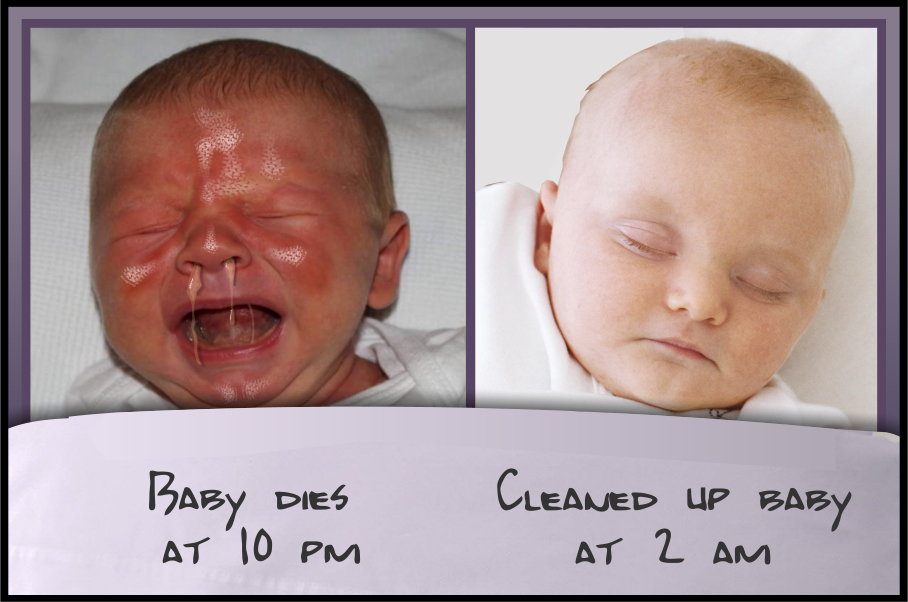
Calling Manslaughter Cot Death
I believe many cot deaths occur because modern party-girl parents or single mothers put their tot in a cot three rooms away, under a tightly tucked-in duvet, and retreat to the living room to party.
Alone in her room, the infant overheats, panics, and cries. Screaming and struggling, her nasal passages fill with mucus, which blocks her nose and enters her mouth. Inhaled into the windpipe, this makes her cough. As her heart races, sweat trickles into her eyes. Her temperature increases as does her claustrophobic hysteria, and fighting against the tight linen makes her hotter still, increasing her panic. In that torture chamber, the roasting babe’s heart gives up as it dies of fright.
Still, the party in the lounge room down the corridor drones on. ‘Friends with benefits’ dance and chat, and the baby’s mother forgets to check in on her daughter. Tears evaporate off the dead girl’s hot cheeks, and as the snot begins to dry, the damp duvet cover does too. After an hour, her body is cool.
Finally, the mother comes to check, but since her one-night stand is trying to drag the woman to her boudoir, she only peeks into the dark room. There is no crying, so she closes the door and scampers away to have fun.
Once her friend finishes his benefits and leaves, the tipsy feminist watches him ride away on his Yamaha Zuma scooter before wandering back to check on the baby at two in the morning. The bub is not moving. She touches her forehead, and it is cold. “Oh my god,” she cries, yanking the duvet away. Clutching her bambino, she calls 911, and while she pleads with the operator to hurry, the duvet, now lying on the floor, dries a little more.
Sobbing, the distraught mother cleans the dried snot off her tot’s face and dries her body. Her diaper is full, and the bodysuit is damp, which fills the mother with trepidation. What will people think if the baby was bathed in sweat and not changed? She also notices moisture on the cot mattress and realizes how incriminating that looks, so she turns the bedding over and fits a new sheet. Seeing the duvet is a little damp, she swaps it for a dry one and drapes the moist one over the hot water tank in the laundry, along with the bodysuit. They will dry in fifteen minutes.
By the time help arrives, the baby is wearing a new diaper and bodysuit, all dry and clean. Her mother dried and brushed her hair, and she looks like a calm angel at rest. The cot has dry, clean linen. Nobody can figure out why the infant died. The police take notes, inspecting the room and the crib, but see nothing untoward. They ask, “Did you tuck her in very tightly?”
The guilty mother sobs, “No, not at all.”
“Was the body hot and sweaty?” they ask.
“No, as you can see. She was dry,” the mother fibs.
“Is this how the baby looked when you found her?” they inquire.
“Why yes, of course,” she sniffles.
“You didn’t change her or clean her up?”
“No, no,” she lies. “Why would I do that?”
“Did you check her throughout the evening?”
“Of course, of course,” the woman assures them.
“How often was that?”
“Every thirty minutes or so.”
“And she was fine?”
“Yes, every time I checked, until the last one.”
“How long was it between the last check and the one before that?”
“About half an hour.”
“And she was fine?”
“Yes, there were no problems.”
“Did you hear any crying or noise?”
“No, none at all.”
“How about music or TV in the living room. Was it loud?”
“No, it was low, but as I say, she was fine just half an hour before I found her… like this,” the woman chokes and sobs.
“Yes, okay. Sorry for the questions; it’s just paperwork. Well, hopefully, the doctor will know what happened,” the embarrassed police shrug.
Cops feel sorry for her. Who would not? Doctors tell them the baby’s heart gave in, but since the baby was dry, its clothes were dry, the cot was okay, etc., they do not know why, so the police mark it down as ‘Sudden Infant Death Syndrome’ and close the file.
When asked, “Did you do a thorough investigation?” the police answer, “Yes,” but in fact, they probably could have done more. Did the officers turn the mattress over to see if it was damp on the other side? Did they examine the laundry to see if there was a wet bodysuit? Probably not. Even if they did, the mother could say the bodysuit was from earlier in the day. How can the cops prove anything?
The mother breathes a sigh of relief. Though she is traumatized by her baby’s death, she knows she was responsible for it. Did she get away with manslaughter, scot-free? To this day, she is walking around with her little secret, as are tens of thousands of other women. In 2017, there were 3600 sudden unexpected infant deaths in the U.S.A. Add up the figures back to the 1960s, in all Western nations and Europe, and you will probably be close to a million. Notice we never heard of this ‘syndrome’ before feminists hit the scene.
Today’s Wikipedia says:
“Sudden infant death syndrome (SIDS), also known as cot death or crib death, is the sudden unexplained death of a child less than one year of age. Diagnosis requires that the death remains unexplained even after a thorough autopsy and detailed death scene investigation. SIDS usually occurs during sleep. Typically death occurs between the hours of 00:00 and 09:00. There is usually no evidence of struggle and no noise produced. The exact cause of SIDS is unknown.”
It reminds me of the brain teaser about the man who stands on a block of ice and hangs himself, after which the ice melts and evaporates. Since there was nothing to stand on, police might conclude it was murder.
Few cops want to accuse the mother because they can see she is devastated, but if they could go back in a time machine to the bedroom thirty seconds before the tot’s heart stopped, what would they find?
Perhaps a screaming, spluttering, panicking, overheated, sweating infant, tightly tucked in, unable to move, whose pulse was racing at 250 beats per minute. It would be wet, snot-faced, and wearing a different bodysuit with a full diaper. If they told doctors that was its condition before dying, the doctors would say, “Oh well, no wonder it died. Its heart gave out after being neglected and tortured.”

Since a cavewoman from a hundred thousand years ago could tell us why you should never isolate a baby like this, why do feminists act so mystified?
Even if feminists’ infants survive this horrible ordeal, imagine the damage it does to them psychologically. Western nations need laws to protect babies from this abuse. Police should charge suspected mothers with manslaughter. Remember that these “mothers” are the same people who insist child discipline is cruel!
In our current society with all its swinging couples, threesomes, single mothers, underage mothers, ‘open partnerships,’ drugs, and parties, I shudder to think how many infants were tortured to death this way.
Sleep
Avoid mollycoddling your child by insisting it has noiseless surroundings in which to doze. “Shhh, the baby is sleeping,” should never be uttered unless people are screaming right next to it. When a youngster grows up in a dome of silence, they are condemned to go through life finding noiselessness before napping. Let the child snooze near activity in the house. It will learn to sleep during even the noisiest times. Waking up when a pin drops might have some advantages if you are 007 the spy, but it will create a problem with insomnia for most people. A lifetime of good sleep will add years to a person’s lifespan.

Growling
As soon as your young one begins to object to, say, diaper changing, the father should loom into its field of view and make a deep growling sound. Rumble, “Shush,” or “Be good,” in a low, deep, stern tone, not too loud. Most babies will look a little worried and stop crying. After a few of those, it should learn to lay quietly while being changed. If the father is not around, the mother should imitate him as best she can.
Toddlers
We now skip to when your children begin to make conscious decisions to break the rules. By two, they are usually walking about, learning, and practicing talking. When you notice an ankle-biter deliberately doing something they know is wrong, you need to act. These days most Western mothers will smile and kiss the child, hug it, and say, “Now, now, we must not throw the cup on the tiles,” but that teaches the child to throw cups on the tiles.
Once again, this is not about mistakes. If a nipper is strolling across the floor on wobbly legs and accidentally brushes against a cup on the coffee table, knocking it to the floor, there is no problem since it was not intentional. You pick up the container, say, “Careful Johnny,” and place it back on the table.
Do not hug him or laugh, as he may decide it is a good thing to knock over crockery. “Careful Johnny” should be said with that solemn, low tone that he has learned to associate with warnings. He may look at the cup, blink, and laugh out loud, but you should remain serious.
Deliberate action is different. For instance, if Johnny reached for the cup, you would say, “Uh-uh, no-o,” in that same low rumbling warning sound while shaking your head from left to right. If he continues to reach for it, pick the cup up and slap the table lightly, saying, “No!” firmly. He might look offended and hurt, but that is fine.
Johnny might spy the cup in half an hour and decide to take another run at it. He glances at you, eyes the target, and begins wobbling over to the table with his hand stretched out eagerly.
What you do next will have a cascading effect on the child for a long time. He will either learn that he can go against your will or that he cannot. It will flavor all his future decisions.
Johnny reaches the coffee table. He picks up the cup and looks around to look at you. Very deliberately and with great pride and cheek, he throws the mug on the floor and laughs loudly. That is your cue. “Bad boy!” you say sternly, moving straight to him. He looks scared. *Cradling his upper body, say, “That was naughty.” Spank the back of his leg once and say, “Bad boy.”
(*Your forearm goes around his chest and under his arm, with your hand on his ribs. His head should be gently nestled against you to keep it safe)
Johnny will probably look shocked. His eyes might fill with water, and his lower lip may quiver. He will look at you fearfully while he decides what to do. Just as he is drawing his breath to start howling, interrupt him by saying sternly, “No crying! No. You must not throw cups. Now be a good boy. Here, you can play with your plane.”
Pat one of his toys and guide him to it. He will stifle his tears and soon be playing with his gadgets and knickknacks, but he will not forget the spanking.
Important – you will be sorely tempted to hug him at this stage, but you must resist. Save it for later. The toddler must know that he will be punished when he intentionally does something bad, not rewarded. Guiding him to the toy was to change the subject. Hugging would confuse him.
The next time he walks past the cup, watch him closely. He will probably look at it, look back at you, look at it, and then wander on past. He has learned that he cannot pick up tableware and throw it on the floor – and no, do not give him a reward or a thank you for this. He is not a poodle and does not need a treat. Some people confuse training children with training pets.
Nature does not follow you around with a tote pouch treating you every time you avoid stepping on a sharp rock, like a dog trainer. It is more like a gangster who shrugs and says, “You walk on the sharp rock, it hurts. You don’t walk on the sharp rock, it don’t hurt. Kapish?”
The child needs the sure knowledge that if he does the wrong thing deliberately, he will suffer. Sharp rock or coffee cup; either way, he can choose suffering or non-suffering. There is no third option involving hugs. Be firm about this. Wimping out will compromise your program.
The old phrase, “You have to be cruel to be kind,” is correct. Your ancestors said it for a good reason.
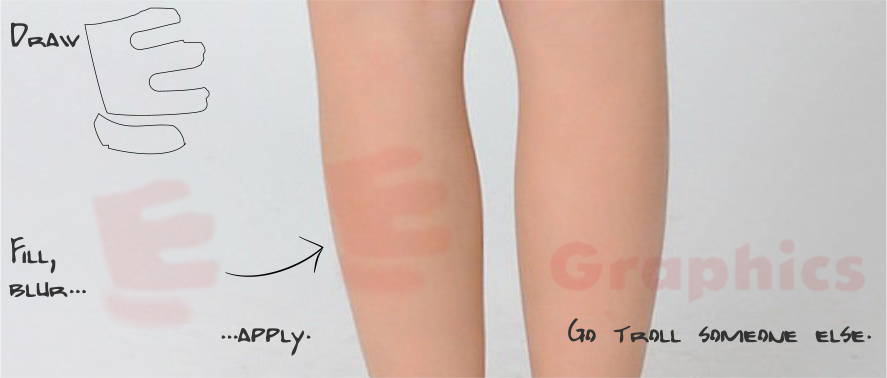
Strength of slap
Many modern parents get this all wrong, and their so-called ‘spank’ is nothing but a pat.
For a two-year-old boy, the slap on the back of the calf or thigh is strong enough to leave a slight pink mark. If your child has brown or black skin, it is about the same strength as when you slap a mosquito on your face – not overpowering.
It is crucial that the slap stings a little, or there will be no point in having it at all. Remember, some children are excellent posers and will pretend a slap hurts more than it does.
No Favoritism
Never go gentler with the girl just because she is a girl. I have seen thousands of people spoil children, and coddled girls are often worse than pampered boys. They can turn into the meanest, cruelest, vilest bruisers on the planet. Going easy on her will only make the boy jealous, and the two may hate each other over time. If you love your kids, male or female, you will do this for them to ensure they grow up properly and are not spoilt.
Consistency
Between the years of two and five, you may only have to smack each of them a dozen times or so, and they should learn to be very well-behaved and obedient. If they are high-spirited and daring, it may require a little more, but regardless, you need to be consistent, and both parents must back each other up. I knew a family of thirteen as a child. All eleven children were boys, and although the father was a strict disciplinarian, he was not reliable. Sometimes he would spank a child for a misdeed; other times, he would let it go. As there was no consistency, all the kids turned into misfits. The last time I saw them, one had died on the back of a motorcycle his brother rode, going too fast. Others were getting into trouble with the law. Discipline only works when handled correctly.
Keeping promises
As they mature, children may still need the occasional spanking, but that is rare. As time goes by, they learn that it is far better to listen and obey their parents than to disobey them and get into trouble. Some kids know that if they misbehave when the family visits friends or relatives or goes shopping, you will not spank them, so they act up on those occasions. To avoid this, use the ‘later at home’ speech. If you are sitting in a restaurant and your six-year-old son begins misbehaving, quietly whisper in his ear, “I’ll have to spank you for that when we go home, and if you do it again, the spanking will be worse.”
The boy will nod, with a pale face, and behave correctly from then on.
When you go home, he will be hoping that maybe you will have forgotten about the punishment. For his sake, do not forget. Remember – consistency. When you go inside, take him into the bedroom and bend him over the bed. Spank his backside three or four times with your open palm and stand him up. “Remember, son, if you do the wrong thing, I will punish you, whether it is there or here. Do you understand?”
“Yes,” he will say, holding back tears.
“Good. Now go wash up and get ready for bed.”
His mother mustn’t ‘reward’ him with gushing affection after a spanking. It could set up the wrong values in his mind, and he may start seeking punishment in return for that special affection. Your job is to raise him to understand right from wrong, not turn him into a masochist with mommy issues. Keep it straight and simple. When tucking him in, you can give him a little hug and say, “I know that you are a good boy. I want you to keep it that way, okay?”
Bad Influences
The better your children are, the more they will attract nuisances and troublemakers, especially at school. I recommend homeschooling, but if you have no choice about sending them to school, train them to avoid the worst children. Explain the need for this, and include a little of the ‘later at home’ talk. My speech would sound something like this:
Tomorrow you will start going to school. Even though we won’t be there, we will be watching you. Your teachers will tell us what is happening, and there is the headmaster on the phone. If you are naughty, we will know.
At school, do what your teacher tells you and follow the rules. Never talk in class unless you are allowed. You may tell us what they taught you later, and we will let you know if what they said was correct. You must be neat and tidy and sit up straight. Can you remember that? Remember that if you are naughty and do the wrong thing, the teacher will tell us, and you know what that means. Do you want a spanking after school? No? Good. Do you promise to be good children in school? Okay, that’s very good.
Using this method, the children pay attention at school and end up as examples for the other students to emulate.
Another time I would give them a talk about who to play with at school.
Can you guess why naughty children would want to be your friend? They might think that some of your success will rub off on them. Perhaps they will meet better people or have more fun. They might also want to copy your test answers, which is cheating. Do you want people like that using you in that way? No? Good. They did not earn the right to have those things, so why give in to them? What kind of children would you prefer to have as friends? How can you tell them apart from bad ones? That’s right. Good ones do what the teacher says and never make trouble. They have good manners, like you. Yes, they say ‘please,’ ‘thank you,’ and ‘you are welcome.’ Make friends with them. Avoid the bad ones. Don’t talk to them, and when you see them, stay away. Play with better kids.
If they fall foul of this rule and end up with a badly behaved brat, have them avoid that child. Monitor their progress. If the nuisance will not leave them alone and the school will not help, change schools, or start homeschooling. The brat will teach them a host of bad habits that may undo your training.
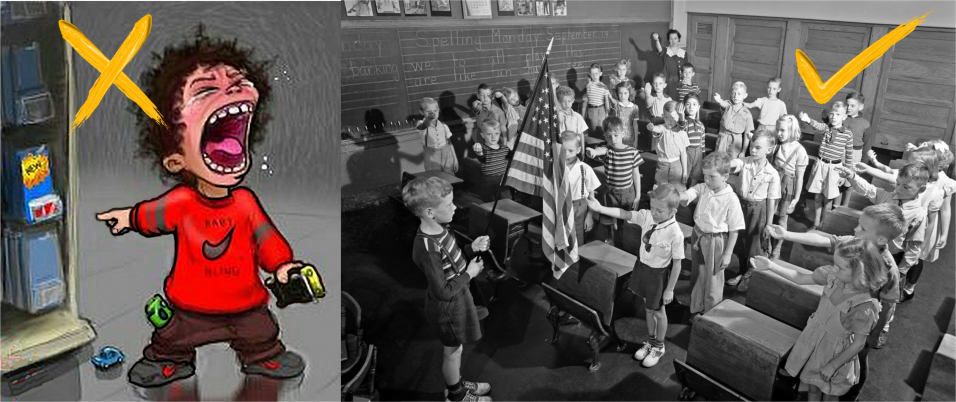
From 5 to 7
Follow this advice correctly and, all things being equal, you should enjoy what few Western parents experience these days. Your children will make you proud as others comment on how polite and well-mannered they are. You will avoid all the horrible tantrums and screaming other parents put up with for years. Smacking should not be necessary now, but it may be once or twice if rare events occur. By the time they are seven, the whole process should be complete, although they may flare up and do something destructive on rare occasions in their early teens. In such cases, the standard procedure was to use a belt to spank them. The father would apply it to the backside. Five or six straps were usually enough. That reminder of what happens when children choose to break the rules was often the last they would need.
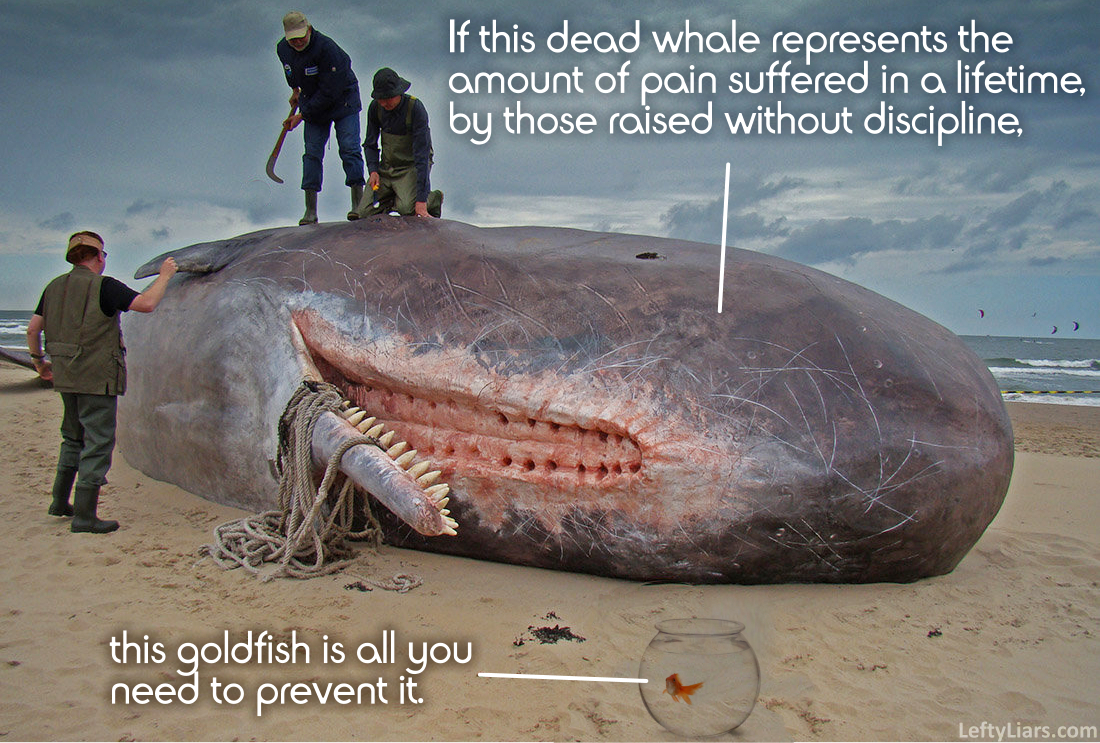
Two minutes compared to decades
Each spank takes but a few seconds. Adding together the small number of times it was necessary, you might end up with a minute or two. A couple of minutes spread over 13 years, with most occurring between years 2 and 7. Compare that to the years that undisciplined children will suffer, throwing endless tantrums, bawling their eyes out habitually, fighting, screaming, demanding, hating, and sulking. They will suffer for the rest of their lives through broken marriages and endless rows, and again with their children, ensuring the cycle continues. It is a constant loop of heartbreak and calamity, all thanks to the mighty Fifth Column. It was the keystone of their sabotage inside Western countries since the Cold War.
The mountain of suffering your children will avoid in exchange for two minutes of mild pain is staggering. Not giving them the discipline that all children require is child abuse on a vast scale.
Love and Affection
All the above is handled together with large quantities of love and warmheartedness. Children should be rewarded for their accomplishments and praised when they succeed. Always be there to defend and look after them. Your family should be warm and encouraging. Discipline is a tiny part of the picture but an essential part.
Please avoid the habit of rewarding children for failing, which has also been promoted by Lefties over the decades—giving a child a gold star when their work is poor, only de-values gold stars. In the olden days, a group of forty pupils would work on an assignment, and in the end, two or three would be praised for being the best. The teacher described one as ‘the best in the class,’ which gave students something to pursue. Nowadays, all students receive a gold star, and all are winners, which provides kids with nothing to chase. What is the point of trying if your score is guaranteed to be equal to the class loser? You may as well lose too. It is a great way to destroy incentives, block ambition, and extinguish creativity.
When I gave my children a score out of ten, it was usually about 7 or 8. I wanted them to know there was still room to do better. On rare occasions, I would give them 9 or 10, and their eyes would light up with delight and pride. It was well worth holding off on the highest scores just for the pleasure it gave them to know they were really that good.

Work – a two-way street
Kids must be given chores from an early age. Lefties will call you a slave driver and various other names, but while your kids learn the ropes and contribute, their kids will turn into lazy pinheads.
From when toddlers walk, you can begin having them fetch various things in the home. “Wendy, hand me that remote control, thank you.”
The little girl goes off to retrieve the remote and happily brings it to you.
“Thank you, darling,” you say and give her a kiss and hug. “Now, please give this to mommy,” you ask, handing her a note.
Wendy toddles off to give the note to mom, who also rewards her with a kiss.
Once again, if Wendy were to forsake her task at any stage, perhaps because she spies her brother playing with a toy and decides to join him, you need to act. “Wendy, I asked you to give this note to mom. Instead, you dropped it and started playing with Johnny. That was bad.” As Wendy’s pupils expand and she begins to pout, you smack the back of her thigh and say, “Naughty. Here is the note.” If Wendy begins to take a breath in preparation for wailing, you interject, saying, “No crying! You must finish the job. Now take the note and give it to mommy.”
Wendy begins walking off with the note and may start crying when she sees her mother, who should not hug and kiss her. Instead, she should look serious, with a raised eyebrow, and say, “Did you drop the note and ignore daddy? Next time bring it to me straight away, and don’t stop to do other things.”
The mother should then re-direct Wendy to do something else, like drawing. Once she is in front of her crayons, she will soon be happy enough but will not forget her lesson. The next time you give her a chore, watch as she takes the article to her mom. Passing a distraction like her brother, or the TV, she may look at the object of interest, glance back at you, think about her options, and continue to her mom. You have taught her that finishing a job leads to pleasure, while giving up may be painful. That lesson will help Wendy work hard all her life, resulting in much success and satisfaction.
When kids are older, they can do much more than simple chores. By seven, they should help clean the house and yard, wash cars, garden, fetch tools, wash clothes, fold and hang the same, and make beds.
By ten, their chores will include washing windows, cooking, cleaning, gardening, and more, mostly with adult supervision.
By fourteen, they can be mowing lawns, fixing tiles, cleaning pools, you name it. Always be there to reward them with affection and encouragement, appreciating and praising their work. You may pay them an allowance too, but if you intend to leave everything to them in your will, they will be investing in their future anyway.
The family benefits in many ways, but at the same time, children benefit as they learn a range of skills and develop an excellent work ethic. Destroying this system and replacing it with the kids doing and learning nothing was one of the Fifth Column’s most significant accomplishments. It had a devastating effect on Western society.
Since we live in a society that calls such normal behavior ‘slave-making,’ you should avoid discussing it. Just raise your kids this way, and when outsiders ask questions, change the subject.
Advice to go with the above:
The Left finds many ways to influence your children and undo your teaching. At the top of their list are school and college, which is why I recommend homeschooling. Other children can bring Leftist propaganda, so you need to deal with that. Then there are social media, which should be banned. Veto smartphones until 14, and then have strict rules about their use. Prohibit computer games. Forbid internet access until they are old enough. I have been advising this since mobile phones and the internet began in the late 1990s but have only noticed media bringing up such issues in the last two or three years. Better late than never, I guess.
Some guidelines:
- Let them go online through a desktop computer in the lounge room/dining area from about ten. Say no to computers in bedrooms.
- Have rules and monitor what they do and where they go online. It should be for education, information, and family communication.
- Prohibit computer games on any device, including online and through TV. At 14, they can play simulated driving or flying games without online human players. Until then, nada.
- Strictly forbid any social media like Facebook. No making “friends” online, period. A worrying percentage of so-called Facebook “friends” are criminals, perverts, stalkers, and enemies. You need “friends” like that like you need a hole in the head. Tellingly, Facebook has no ‘dislike’ button. Neither did Stalin, Mao, Hitler, Kim, or Fidel. Socialists hate criticism, and Facebook supports Socialist Democrats.
- Ban smartphones until the kids are 14. If their school requires them to have them, change schools. The only exception is if they work in your business and need to be in touch. If so, monitor their phone use, restricting it to phoning you and a shortlist of others.
- Do not allow kids to have bedroom TVs and oversee the one they watch in the living room. Provide rules about what they may see. Use the parental lock to lock various channels.
- Encourage them to watch conservative educational shows, documentaries, and wholesome movies. Avoid any left-wing political propaganda.
- When they do begin using cell phones at 14, strictly monitor their use. Communicating with trusted friends and family is great; meeting strangers online is not.
- In time they can gradually do more, but always watch what is going on and be aware of the dangers.
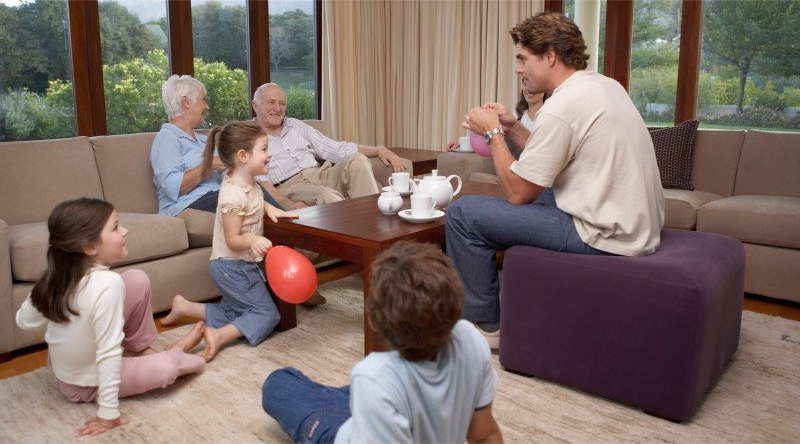
Regular Talks
Supplement all the above with regular talks about what is going on in the world. Your children need to understand your reason for being strict about these matters. When they grasp what Lefties are up to, they will appreciate your motive and work with you. Some parents forget this part, and their offspring skedaddle to join the Left, leaving mom and dad scratching their heads, wondering why. They failed to give their kids a good reason for all the rules.
In some cases, they are afraid that talking about the Left might encourage their kids to go that way, which is a mistake. The old maxim ‘Know Thine Enemy’ applies to you, your spouse, and your children. The entire family needs to know the enemy.
Tour Guide
There is a difference between letting kids watch CNN for hours on their own and showing them an excerpt that you discuss. The latter is fine. Play the piece and point out the lies. While you do not want them watching leftist propaganda on their own, it is fine to be a ‘tour guide’ to show portions of it, highlighting the falsehoods. The kids can ask questions and even debate with you on the details. That is healthy and a part of their education. They will go through phases where they disagree with you about some issues, which is fine. Overall you will see that when you reveal how the Left deceive and explain why they do this, your children will see through them soon enough.
16 to 18
Even disciplined children will find it difficult once they reach sixteen. It is best to say little and wait for the storms to pass before talking about them. Teens will also develop bold new ambitions, and you may need to rein in some of those gently to prevent your child from rushing off on some far-off mission. They are vulnerable at that age, and you should kindly remind them what is essential. They will listen, unlike those lacking discipline, which is one consolation.
Raise your children to understand the importance of family and why moving far away is not as productive as living close by. As your children leave the nest and start their own families, you will be there to help them and they, you. You will enjoy grandchildren while you still have a few decades left instead of waiting until you are an octogenarian. You will probably enjoy the coming of great-grandchildren, too, because your children did not delay having kids. If your children also raise their offspring with discipline, your family will be mighty – a nice change from skin-and-bones Western clans these days.

Ghost Kin
Many family trees are missing ‘ghost kin’ as I call them – all the relatives who would be alive were it not for feminism. Take a family of seven back in the 1960s, with two parents and five siblings. Normally the siblings would each produce between 3 and 5 children (say an average of 4) in their 20s and 30s. Those 20 grandchildren would produce another 80 children by the time they were in their 30s. The family would now be 107 strong, including the first two parents, who would be in their 80s or 90s. At 85, they could boast about having 80 great-grandchildren.
If you know an 85-year-old, count how many great-grandchildren he or she has. Often these days, it will only be a handful, thanks to feminists who spent the last fifty years persuading millions of women to delay having children and to limit them to one or two.
Many women followed that advice, and ‘ghost kin’ number in the tens of millions. Thanks, feminists, for deleting all those armies of would-be grandchildren, great-grandchildren, nephews, nieces, nephews-in-law, nieces-in-law, great-nephews, great-nieces, cousins, second cousins, third cousins, and so on. Many elderly feminists today live lonesome lives, wondering why they have no visitors. How many of them realize they deleted all the kin who would have visited them every day?

To make sure you do not suffer the same fate:
- Encourage your children to have many offspring – the more, the merrier, while they are young.
- Explain what assets children are, especially when parents are old and need help and assistance.
- Neutralize the common idea that kids are a burden.
Enjoy raising your family, and I wish you the best of luck.





